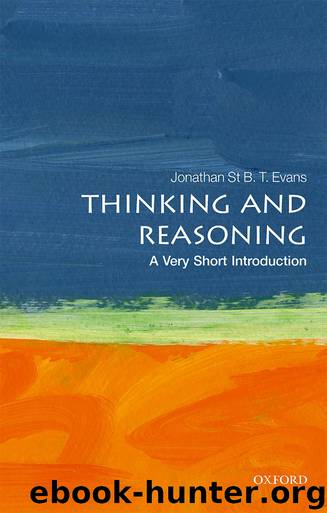Thinking and Reasoning by Jonathan St B. T. Evans

Author:Jonathan St B. T. Evans
Language: eng
Format: epub
ISBN: 9780191091131
Publisher: OUP Oxford
Published: 2017-06-12T16:00:00+00:00
Probability judgement: heuristics and biases
The theory of rational decision making requires that we assign probabilities to events in order to devise a decision tree of the kind shown in Figure 8. Clearly, our ability to make effective decisions under risk requires us to estimate these probabilities with some accuracy. But how do we make such judgements, and are these also subject to cognitive biases? A consensual view in the 1960s was that people were pretty good intuitive statisticians. This idea was quite simply blown apart by a series of studies that commenced in the 1970s and which have strongly influenced the field to the present day. This is the other work for which Daniel Kahneman received a Nobel Prize, also in collaboration with the late Amos Tversky. They initiated what has become known as the heuristics and biases research programme. Vast amounts of research have followed, involving many different authors.
What Kahneman and Tversky did was to propose that we judge probabilities by applying certain heuristics, but that these can lead to cognitive biases. As discussed in Chapter 2, a heuristic is a short-cut method to solving a problem that may work quickly but may also fail. As an example, consider the availability heuristic proposed by Kahneman and Tversky. This is the proposal that we judge the probability of events by the examples that we can call to mind. Suppose that someone asks me how many goals, on average, are scored by Arsenal football club in each match. I am a big Arsenal fan and follow most of their games on television or radio, always checking the results of those I miss. So I could attempt to answer this by calling to mind different games and estimating the average number of goals. I might be quite good at this but there could still be biases due to the way human memory works. For example, I might remember more of their better games and so overestimate the number of goals. Or I might remember more of their recent games and hence be biased by a particularly good or poor run of form.
Kahneman and Tversky demonstrated many such biases resulting from the availability heuristic. For example, if you ask people if there are more English words with the letter ‘k’ in the first or third position, most people say the first even though there are actually twice as many words with a k in the third position. The reason, it seems, is that it is much easier to retrieve words from memory by their initial letter and hence draw examples to mind. However, they also proposed other heuristics which apply in different circumstances, the most important of which is representativeness. This can be illustrated with their famous Linda problem. Participants are told that Linda is thirty-one years old, single, outspoken, and very bright. She majored in philosophy and was deeply concerned with issues of social justice and discrimination, and also participated in anti-nuclear demonstrations.
Participants are then asked to rate the likelihood of several statements including the following:
1.
Download
This site does not store any files on its server. We only index and link to content provided by other sites. Please contact the content providers to delete copyright contents if any and email us, we'll remove relevant links or contents immediately.
The Art of Thinking Clearly by Rolf Dobelli(10450)
Mindhunter: Inside the FBI's Elite Serial Crime Unit by John E. Douglas & Mark Olshaker(9317)
Change Your Questions, Change Your Life by Marilee Adams(7756)
Nudge - Improving Decisions about Health, Wealth, and Happiness by Thaler Sunstein(7689)
Mastermind: How to Think Like Sherlock Holmes by Maria Konnikova(7320)
The Power of Now: A Guide to Spiritual Enlightenment by Eckhart Tolle(5746)
Men In Love by Nancy Friday(5232)
Altered Sensations by David Pantalony(5093)
Factfulness: Ten Reasons We're Wrong About the World – and Why Things Are Better Than You Think by Hans Rosling(4730)
The Confidence Code by Katty Kay(4251)
Thinking in Bets by Annie Duke(4216)
Man and His Symbols by Carl Gustav Jung(4127)
The Worm at the Core by Sheldon Solomon(3484)
Why Buddhism is True by Robert Wright(3446)
Liar's Poker by Michael Lewis(3441)
Three Women by Lisa Taddeo(3422)
The Inner Life of Animals by Peter Wohlleben(3307)
Descartes' Error by Antonio Damasio(3270)
How Music Works by David Byrne(3259)
